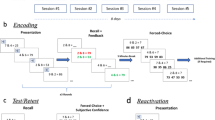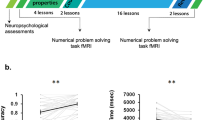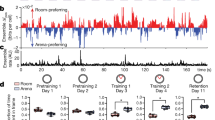Abstract
IN an earlier report1 we demonstrated an optimal transfer effect of learning in rats when donors were trained for 10 days (twelve experimental sessions) and when adult recipients were not habituated to the conditional stimulus. The transfer problem seems to be very important as far as an understanding of the mechanisms of memory storage is concerned; we thus continued our investigations with rats to determine whether the successful transfer phenomenon is reproducible after destruction of brain RNA and, if not, which fraction of the brain RNA is responsible for the successful effect.
This is a preview of subscription content, access via your institution
Access options
Subscribe to this journal
Receive 51 print issues and online access
$199.00 per year
only $3.90 per issue
Buy this article
- Purchase on Springer Link
- Instant access to full article PDF
Prices may be subject to local taxes which are calculated during checkout
Similar content being viewed by others
References
Adám, G., and Faiszt, J., Nature, 216, 198 (1967).
Kimberlin, R. H., J. Neurochem., 14, 123 (1967).
Wilcoxon, F., and Wilcox, R. A., Some Rapid Approximate Statistical Procedures (Lederle, Pearl River, NY, 1964).
Author information
Authors and Affiliations
Rights and permissions
About this article
Cite this article
FAISZT, J., ADÁM, G. Role of Different RNA Fractions from the Brain in Transfer Effect. Nature 220, 367–368 (1968). https://doi.org/10.1038/220367a0
Received:
Revised:
Published:
Issue Date:
DOI: https://doi.org/10.1038/220367a0
Comments
By submitting a comment you agree to abide by our Terms and Community Guidelines. If you find something abusive or that does not comply with our terms or guidelines please flag it as inappropriate.



